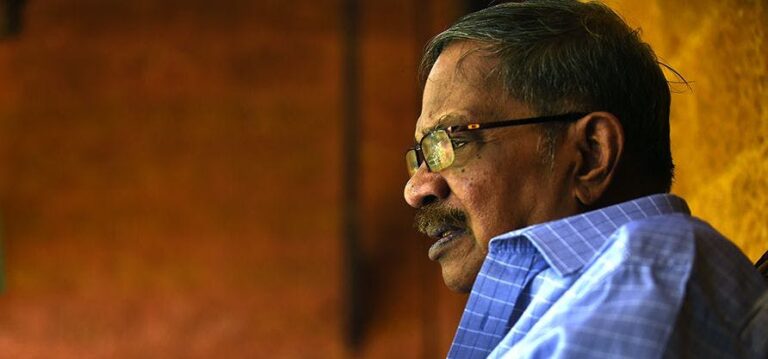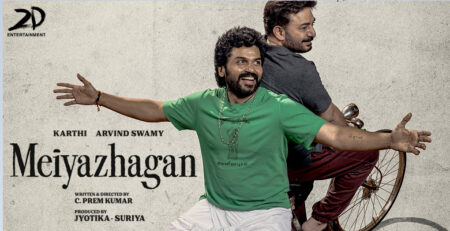A series that highlights what is commonly considered to be one of the lesser achievements of legendary writer and filmmaker MT Vasudevan Nair – his screenplays.
For Malayalis, it is, without doubt, the most famous initials. Two letters that inspire and influence countless. That set a benchmark that is rarely approached. That redefine the limits of imagination. Two letters, when together, are emblematic of quality literature.
Madath Thekkepattu Vasudevan Nair, adoringly known as MT, is a bona fide Indian legend. His works have received appreciation and adoration from all parts of society. In this series, I want to highlight what is commonly considered to be one of his lesser achievements – his screenplays.
Sometime during the mid of the last century, the visual medium started its march to the crown of popularity overtaking the written word. Passive viewing became preferred to active reading. MT raised the standard of screenplays for Malayalam movies and inspired a lot of writers to try out the medium.
Over the years I have collected his movies in the form of video cassettes, Moser Baer CDs, DVDs, YouTube downloads, whatever way I could. Unfortunately, I am still missing some of his earlier movies. But this is my evaluation of an incredible body of work.
Film: Murappennu (The Customary Bride), 1965
Cast: Prem Nazir, Madhu, KP Ummer, PJ Anthony, Sharada, Jyothi Lakshmi, Nellikode Bhaskaran, Adoor Bhasi, Sukumari
Director: A. Vincent
There was a custom among certain castes in Kerala to marry their first cousin. A practice that might be shunned as incestuous nowadays. I am not sure how prevalent it actually was. I personally do not know of a single such case. However, it was extremely common in movies. Possibly because it gave chances for the hero and heroine to be in each other’s presence, something which otherwise would be too much of a stretch in society these days.
MT’s first screenplay was on this practice. It should really have been named in the plural as there are two of them and we do not know with certainty who is the titular one. In fact, debutante Jyothi Lakshmi gets top billing above Sharada. The movie has not aged well and is more or less a by-the-numbers family drama, though there are instances and dialogues when MT tries to go out of the box. He even inserts himself into the dialogue at one point.
Prem Nazir takes on the leading man role with his usual ease and theatrics. He even gets to say ‘Mandi Penne!’ Madhu has precious little to do. P J Anthony revels in the best role in the movie. Jyothi Lakshmi is coy and mischievous at the same time. Sharadha should have had a better role, but even then you can recognise the actress who would be known for her natural style of emoting.
Murappennu is directed by Alosius Vincent, father of cinematographers Jayanan and Ajayan. As was probably the case for most films those days, the film was made mostly in Chennai and the technicians are almost all Tamilians.
The screenplay was adapted from a short story ‘Snehathinte Mukhangal’. It was heavily redone and other than a few characters and a few plot points bear little similarity to the source material. Other than the Bhaskaran-penned immortal song Karayunno puzha chirikkunno (The river, does it laugh or cry?) there may not be much to recommend for a modern audience. However, it introduced MT to the medium he ruled for decades. That is more than a good enough reason to revisit it.
Film: Pakalkinavu (Daydream), 1966
Cast: Sathyan, Sharada, Nellikode Bhaskaran, Premji, Adoor Bhasi,
Director: SS Rajan
You tend to take a double-take when the sixties’ Malayalam movie you are watching opens with a shot in front of the Vidhana Soudha in Bangalore! Unfortunately, there was pretty much no other landmark that I recognised. The Bangalore of half a century ago might as well be a different country altogether.
Babu (Sathyan) is a rich brat who doesn’t know what to do with his life, except spend it with a different girl and a different bottle each night. Into his life comes Chandran (Bhaskaran), a penniless young man whose morals are his only wealth. He introduces Malathi (Sharada) to Babu and things go as one would expect in the debauched Bangalore of the 1960s.
My familiarity with Sathyan on-screen pretty much began and ended with Chemmeen. I hadn’t seen him in anything else, though I was aware of his legend. I was pleasantly surprised to see how he took on the rogue’s role. In fact, he was so good that you lose interest when he starts his inevitable transition into the good guy. Nellikode Bhaskaran has a really plum role. Sharadha is once again under-utilised. National Award winner Premji has a small role.
It is scary how much smoking there was in movies those days. Sathyan is rarely not lighting up. Also, and this is probably because he was an army officer in the British Indian army, his English is quite good. He uses the language to humorous effect. The case in point is a dialogue that goes, “Bitch, bhayangara bitch!”
MT was still finding his footing in Malayalam cinema. He was trying to find the right balance with a great story and also something that would bring people to the theatres. Pakalkinavu oscillates between interesting and the well-trodden. Right till the final moments he tries to bring in interesting questions. But then he falls back to familiarity. It could have been a completely forgettable entry in MT’s oeuvre, but for Sathyan’s remarkable turn.
Film: Iruttinte Athmavu (The Soul of Darkness), 1967
Cast: Prem Nazir, Sharada, Thikkurissy, P.J. Anthony, Sukumaran Nair, Sankaradi, Philomina
Director: P. Bhaskaran
Probably the second-best lyricist in Malayalam (after the immortal Vayalar), Bhaskaran has also donned the attire of a producer and director. When he directs a script from MT, fans are in seventh heaven. Iruttinte Athmavu, which MT adapted from his own short story of the same name, is a landmark film in many ways.
Velayudhan (Nazir) is a simpleton. He possesses the mental capabilities of a child. He lives with his mother (Shantha Devi), uncle Gopalan Nair (P.J. Anthony) and cousin Ammkutty (Sharada). His existence is a burden for all except Ammukutty. He keeps getting into trouble. Things take a turn decidedly for the worse when the other daughter of the house Meenakshi (Philomina) returns to her house from Singapore along with her husband Madhavan Nair (Thikkurissy) and kids.
MT explores the stigma attached to the mentally challenged and how it was taken as a sign of madness. Things have not changed all that much now, so one can imagine how progressive this may have been over half a century ago.
Prem Nazir, the evergreen romantic hero, undergoes a tremendous transformation. Unfortunately, the modern viewer cannot shake away the feeling that the role only serves to highlight his shortcomings in the natural acting department. Sharada does have a good role, as does PJ Anthony. Thikkurissy, Sankaradi and Philomina, who we saw as jocular elders in the 1980s and19 90s, have very serious roles.
Bhaskaran throws subtlety, which was the hallmark of his songs, out of the window when it came to direction. Every alternate scene is a play in shadows. The songs are a distraction but probably required by the times. This is a social documentary out and out. It wants to reach a wider audience but refuses to dumb down for them.
(To be continued)




